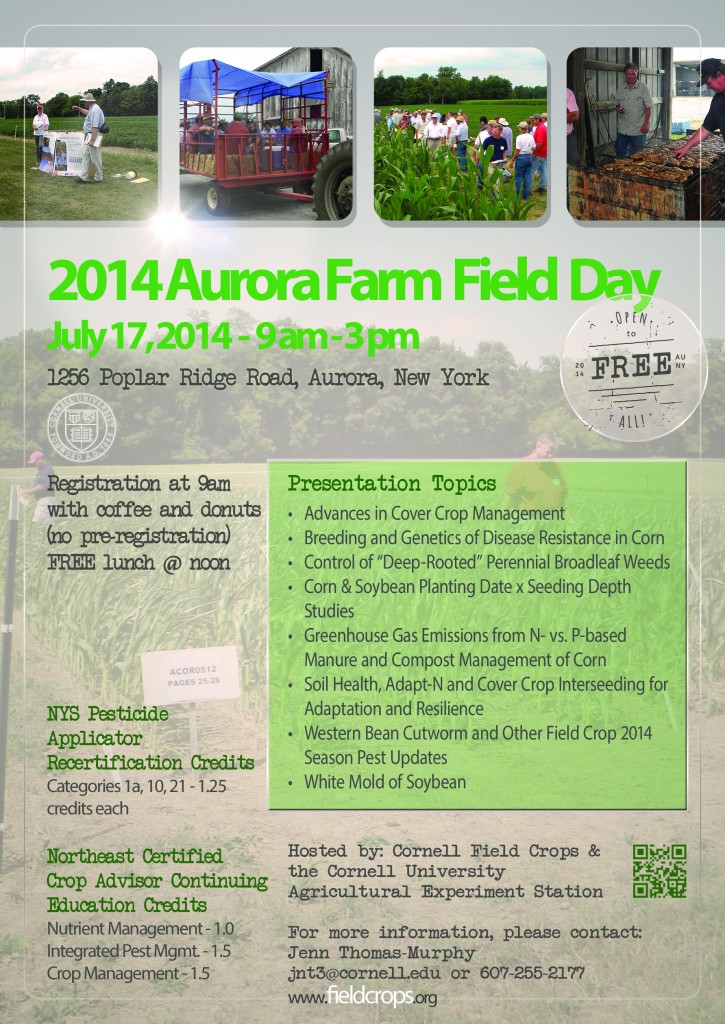 Don’t forget, this year’s Aurora Farm Field Day is taking place on Thursday, July 17th! The full agenda of presentation topics for the day is out and is available below.
Don’t forget, this year’s Aurora Farm Field Day is taking place on Thursday, July 17th! The full agenda of presentation topics for the day is out and is available below.
9:00-9:45 am Registration & Refreshments in Field house
9:45-9:50 am Introduction –Bill Cox, Professor of Crop Science, Cornell University
|
Walking Tour |
Wagon Tour |
Times |
|||||
|
Presentation |
Field |
Map |
Presentation |
Field |
Map |
Morning |
Afternoon |
| Russ Hahn
Control of “Deep-Rooted” Perennial Broadleaf Weeds |
FH |
1 |
Matt Ryan
Advances in Cover Crop Management |
W |
5 |
10:00–10:25 |
1:00–1:25 |
| Keith Waldron, Ken Wise
Western Bean Cutworm and other field crop 2014 season pest updates |
C |
2 |
Margaret Smith and Judy Kolkman
Breeding and Genetics of Disease Resistance in Corn |
P2 West |
6 |
10:30-10:55 |
1:30-1:55 |
| Bill Cox
Corn and Soybean Planting Date x Seeding Depth Studies |
C |
3 |
Jaime Cummings
White Mold of Soybean |
Z North |
7 |
11:00–11:25 |
2:00–2:25 |
| Bianca Moebius-Clune, Harold Van Es, Dan Moebius-Clune and Matt Ryan
Soil Health, Adapt-N and Cover Crop Interseeding for Adaptation and Resilience |
E |
4 |
Quirine Ketterings, Greg Godwin, Amir Sadeghpour and Karl Czymmek
Greenhouse Gas Emissions from Nitrogen- vs. phosphorus-based manure and compost management of corn |
Z |
8 |
11:30-11:55 |
2:30-2:55 |
12:00 -12:55 pm Lunch
3:00 pm Opportunity for discussion with presenters
Pick up CCA and DEC credits
Western Bean Cutworm and Other Field Crop 2014 Season Pest Updates
Western Bean Cutworm (WBC) is a late pest of field and sweet corn and dry beans, affecting yield and quality of ears and bean pods. Damage to corn ears increases risk of infection with fungi that produce mycotoxins. While there have been no reports of economic losses in NY to date, monitoring efforts have determined this pest now occurs across NY and its numbers are increasing particularly in western and northern regions. In addition to discussion on WBC, we will provide an update on the status of other significant field crop pests active in the 2014 season.
Corn and Soybean Planting Date x Seeding Depth Studies
A discussion of 2013 results and 2043 research trials. Topics will include variety comparisons, planting rates, early plant populations, and yields.
Control of “Deep-Rooted” Perennial Broadleaf Weeds
“Deep-rooted” broadleaf perennial weeds such as bindweed, hemp dogbane, horsenettle, and common milkweed are difficult to control due to their ability to re-seed as well as translocate food reserves from leaves to rhizomes in preparation for over-wintering. Field Crop producers need to understand how the levels of these underground carbohydrate reserves change during the year and how they can use this information to maximize the effectiveness of translocated herbicides against these tough weeds.
Soil Health, Adapt-N and Cover Crop Interseeding for Adaptation and Resilience
New developments in Soil Health Testing, the Adapt-N tool, and Cover Crop interseeding will be discussed. All can help growers adapt to changing weather and improve their farms’ resilience. We will provide updates on the new, more comprehensive Cornell Soil Health Test indicators and report format and on the Adapt-N tool. Three years of Adapt-N on-farm trials show the tool is highly successful at reducing unneeded N inputs in corn, suggesting increased rates when needed, decreasing environmental losses, and improving farmer profits and yields. We will showcase interseeded cover crops in the long-term tillage trial where these topics all intersect. We will also discuss where our research and further development is headed.
Advances in Cover Crop Management
Cover crop utilization in northern regions has been limited by short growing seasons, cooler and more poorly drain soils, and perceived lack of benefits relative to costs. However, cover crop management has evolved and new practices have recently been developed that overcome past challenges and increase the benefits they provide. Participants will learn about new research including drill interseeding cover crops in standing corn and soybean, using cover crops to facilitate organic no-till soybean production, and harvesting cover crops for forage.
White Mold of Soybean
White mold can be a devastating disease affecting soybeans in many production areas of the state. Due to the persistence of the pathogen in the soil through crop rotations and inadequate data on the cost effectiveness of fungicide applications, white mold is currently undermanaged in NY. Genetic tolerance/resistance may be a grower’s best tool for managing white mold. An evaluation of current soybean varieties, groups 0-II, for relative tolerance/resistance to white mold is being conducted in order to determine whether variety selection is a viable tool for New York growers to combat white mold.
Breeding and Genetics of Disease Resistance in Corn
Leaf diseases in corn, particularly northern leaf blight and gray leaf spot, appear to be more prevalent in certain areas of New York in recent years. We will discuss our research on the genetic nature of disease resistance and how knowledge about the genetics can help in developing and managing resistant varieties. We will also highlight recent breeding efforts to build high yielding, disease resistant corn hybrids for New York growing environments.
Greenhouse Gas Emissions from Nitrogen- vs. Phosphorus-based Manure and Compost Management of Corn
Discussions of greenhouse gas emissions from nitrogen- vs. phosphorus-based manure and compost management of corn.

